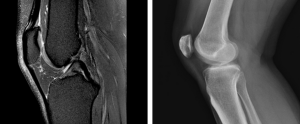 We all try to be more active, especially when the weather is great. We also understand that life is busy and it can be hard to find time to take care of yourself. All too often you put your aches and pains on the back burner. So, when you do finally get around to a doctor’s visit, we understand that you want to make sure the source of your pain is properly diagnosed on the first try.
We all try to be more active, especially when the weather is great. We also understand that life is busy and it can be hard to find time to take care of yourself. All too often you put your aches and pains on the back burner. So, when you do finally get around to a doctor’s visit, we understand that you want to make sure the source of your pain is properly diagnosed on the first try.
Knee pain is one of the most common conditions referred to radiology and surprisingly, is a more prevalent issue than many people may think. While clinical information is vital, viewing images of the joint offers the best method for determining if the soft tissues or bone have been compromised. That’s why a knee MRI can provide useful information, since x-rays provide limited evaluation of these soft tissues and often underestimate the extent of bone injuries.
MRI, short for magnetic resonance imaging, is a type of scan that manipulates magnetic fields to generate exquisite images of the body’s soft tissues such as muscles, ligaments, tendons, and specifically the menisci and articular cartilage in the knee. An MRI does not use any form of radiation.

Lateral views of the knee. The left image is from a MRI. The right from an x-ray. Much more detail is available from the MRI.
In addition, MRI is accurate in demonstrating fluid collections in and outside the joint, soft tissue swelling, and swelling within the bone itself that may be the result of a bone bruise or stress fracture. Loose fragments of cartilage or bone within the joint are also readily seen. A knee MRI is common for pre-operative planning in the case of advanced arthritis which could require a total knee replacement.
It is common to uncover significant and unexpected findings through an MRI can alter treatment plans and MRIs are essential for orthopedic surgeons to determine the need for surgery and/or physical therapy. This means less time spent at the doctor’s office and more time getting back to the things you love.
In addition to helping diagnosis chronic problems, a knee MRI can be extremely helpful if there is:
- Concern of a tumor
- Severe acute trauma
- An injury that involves an athlete who’s anxious to return to the playing field quickly without sustaining any further harm
It’s important to have a conversation with your primary care provider to determine if or when a knee MRI can be a helpful part of your treatment.
What to Expect
At Wake Radiology, a knee MRI takes approximately 30 minutes.
For a knee exam, a patient lies on his/her back on the exam table. We provide a pillow for your head and place a knee coil around the knee that needs to be scanned to collect image data.
MRIs can be loud so we provide you with a set of headphones. You may listen to the music of your choice. This also provides a way for you to hear any communication from the technologist who is performing your scan.
You are placed into the scanner feet first so that your head is near the opening of the magnet. For a quality scan, the knee must be in the center of the machine. For most people, this means going into the scanner to about the level of your chest. However, if claustrophobia is still a concern, Wake Radiology physicians are available to administer IV Valium. If you feel that IV Valium may be necessary, please DO NOT take sedation by mouth prior to the examination. You also must be accompanied by a driver.
Once the scan is complete, we’ll remove the knee coil and help you get off the table. At this point, the knee MRI is complete and all you need to do is get dressed.
At Wake Radiology, all knee MRI images are interpreted by a radiologist who trained specifically to review orthopedic and sport images. Results from this type of procedure are typically sent to your physician within one day.
Obtaining a Knee MRI
We encourage you to talk with your primary care or orthopedic doctor about your knee pain and to determine if getting a knee MRI could be helpful to you. If together you decide on this course of care, consider Wake Radiology and find out more about our team approach to imaging. Wake Radiology offers MRI services at most of our outpatient locations throughout the greater Triangle.